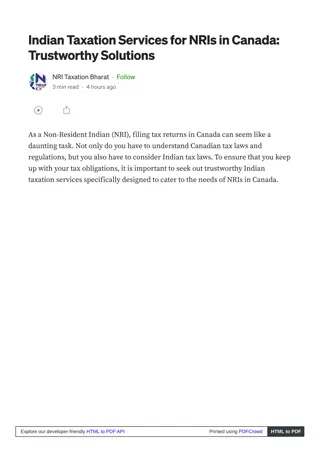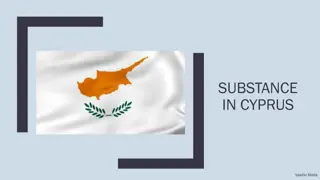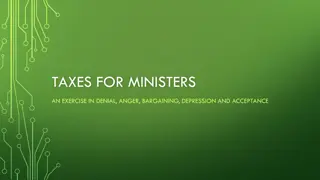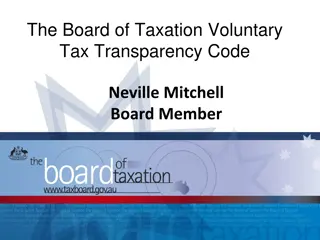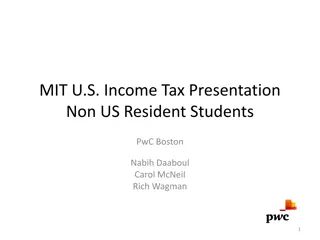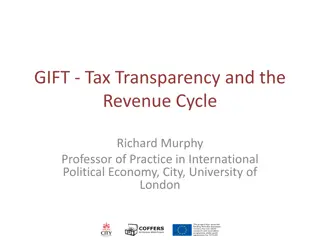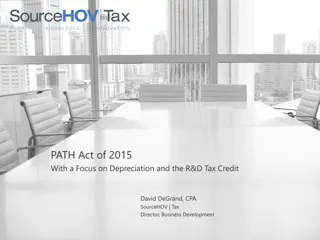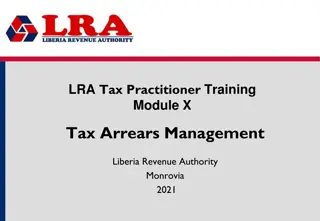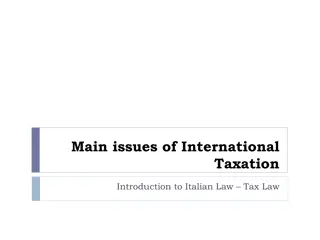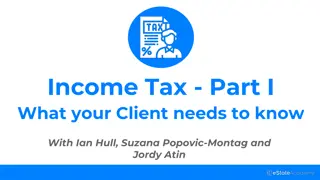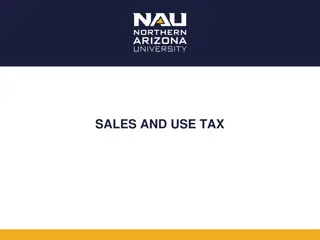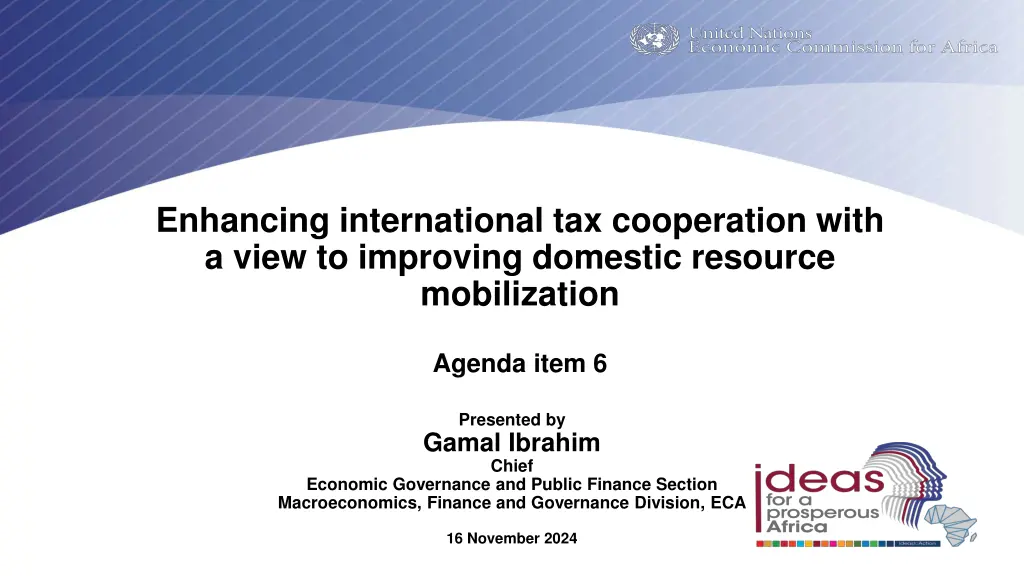
Enhancing International Tax Cooperation for Domestic Resource Mobilization
Explore the historical inequalities in the prevailing international tax system and the push for African leadership in shaping inclusive taxing rights for the Global South. Learn about efforts to promote effective tax cooperation and curb illicit financial flows at national, regional, and global levels.
Download Presentation

Please find below an Image/Link to download the presentation.
The content on the website is provided AS IS for your information and personal use only. It may not be sold, licensed, or shared on other websites without obtaining consent from the author. If you encounter any issues during the download, it is possible that the publisher has removed the file from their server.
You are allowed to download the files provided on this website for personal or commercial use, subject to the condition that they are used lawfully. All files are the property of their respective owners.
The content on the website is provided AS IS for your information and personal use only. It may not be sold, licensed, or shared on other websites without obtaining consent from the author.
E N D
Presentation Transcript
Enhancing international tax cooperation with a view to improving domestic resource mobilization Agenda item 6 Presented by Gamal Ibrahim Chief Economic Governance and Public Finance Section Macroeconomics, Finance and Governance Division, ECA 16 November 2024
Historical inequalities and disparities of the prevailing international tax system International taxation has served as a tool for domination, enabling wealthier countries to assert control over the economic affairs of less powerful nations The international tax architecture has continued to favour the interests of multinational corporations and facilitated tax avoidance and profit shifting International tax rules, predominantly based on the arm s length principle, have proven inadequate in capturing the economic realities of an interconnected global economy Multinational corporations, through transfer pricing and other mechanisms, have manipulated their financial flows to minimize tax liability, exacerbating the revenue shortfalls experienced by developing countries, mostly from Africa The historical legacy of international taxation also reflects a power imbalance in decision-making processes with limited African representation Against this background, African policymakers continued to advocate for more inclusive and equitable solutions to international tax cooperation challenges.
African Leadership for the Inclusive Taxing Rights of the Global South The AU-ECA HLP report on IFFs in 2015 reflecting the urgency for Africa to shape the international tax agenda on its own terms FACTI Panel, AU and other Pan-African institutions, and the UN Tax Committee work FACTI Panel report in 2021 reiterating the recommendations In response to the initiative of the Africa Group in NY, the UN General Assembly adopted the resolution 77/244 to begin discussions promoting inclusive and effective tax cooperation CoM Resolution 990 (LIV) to develop a capacity training work plan on tax-related matters and to build capacity of the member States to tackle the institutional gaps, to track, measure and report on IFFs, and devise measures to curb IFFs Africa-led call to undertake actions at the national, regional and global levels to ensure a mechanism for global coordination and overcome a siloed approach to addressing tax and IFFs matters The UNSG s report/proposal contained in document A/78/235
How Can the Proposed UN Framework Convention Ensure Equitable Representation for the Global South? Support member states to pursue better alternatives than the OECD s two pillar proposal Continue to call for international tax cooperation that is fully inclusive and gives every nation an equal say in decision-making on international tax matters Facilitate partnerships or collaboration at regional level with specialised bodies/institutions assistance to help build robust tax systems and policies that can provide technical Use the intergovernmental tax body as a platform for dialogue and cooperation to foster an environment of transparency, ensuring fair tax competition and reducing IFFs
African Leadership on the UN Framework Convention on International Tax Cooperation Development The 77th UN GA's Second Committee adopted resolution 77/244, introduced by a group of African nations. The UN Secretary-General report was released, outlining three potential paths to create a more inclusive tax framework The UN GA adopted Resolution 78/230 to establish an Ad Hoc Committee to formulate the approach for a Framework Convention. On 7 June 2024, the Ad Hoc Committee's Bureau released and requested stakeholder feedback on a ZeroDraft for the ToR A revised ToR was released in mid-July and was the basis for discussions at the Second Session of the Ad Hoc Committee from 29 July to 16 August 2024 On 16 August, the Intergovernmental Committee on International Tax Cooperation adopted the Draft ToR for a UN Framework Convention on International Tax Cooperation.
What does the Draft ToR Contain? Major structural elements including objectives, principles, commitments, and provisions on capacity building, timeframe and approach for negotiation Development of protocols which would be legally binding instruments under the Framework Convention The ToR reference two early protocols to be developed simultaneously: (1) a protocol to address taxation of income derived from cross-border services in an increasingly digitalized and globalized economy"; and (2) a protocol focusing on four priority areas: (a) taxation of the digitalized economy; (b) measures against tax-related IFFs; (c) prevention and resolution of tax disputes; and (d) addressing tax evasion and avoidance by high-net worth individuals and ensuring their effective taxation in relevant UN member jurisdictions. Consideration could be given to protocols, including tax cooperation on environmental challenges, exchange of information for tax purposes, mutual administrative assistance on tax matters, and harmful tax practices.
Next steps of the Draft ToR of UN Framework Convention on International Tax Cooperation An intergovernmental negotiating committee is to meet three times per year over the next three years (2025 2027) to draft the Framework Convention and the two early protocols. The negotiating committee is to complete its work during this period and submit the final text of the Framework Convention and protocols for consideration at the 82nd Session of the UN General Assembly. A vote to adopt the text of the Framework Convention requiring a two-thirds majority of the General Assembly would occur in late 2027, with the Framework Convention then available for UN member jurisdictions to sign and ratify.
What is the current status? The Terms of Reference for a UN Framework Convention (UNFC) on International Tax Cooperation have been approved on 16 August 2024, and the UNFC, together with two early protocols will start being negotiated in 2025. The framework convention will be elaborated by a Member State-led negotiating committee that would meet in 2025, 2026 and 2027 and complete its work and submit the final text of the framework convention and of the two early protocols to the General Assembly for its consideration in the first quarter of the eighty-second session (in 2027). Two early protocols should be developed simultaneously with the framework convention. One on the taxation of income derived from the provision of cross-border services in a digitalized and globalized economy. The second early protocol should be decided at the organizational session of the intergovernmental negotiating committee in Feb 2025.
Framework Convention for International Tax Co- operation: Commitments and Early Protocols Additional enabling factors such as resources, transparency, inclusivity and policy coherence Fair allocation of taxing rights Addressing tax-related IFFs int tax coop approaches that will contribute to the achievement of SDGs mutual admin assistance in tax matters, including, transparency and exchange of information for tax purposes addressing tax abuse by high- net worth effective prevention and resolution of tax disputes. Taxation of the digitalized economy Measures against tax-related IFFs Early protocols Prevention and resolution of tax disputes Commitments Addressing tax evasion and avoidance by high- net worth individuals
Some Suggestions for the Content of the Framework Convention on International Tax Cooperation Purpose with introduction and purpose of the convention, importance, definitions of key concepts Objectives of the framework convention General principles delineating principle of sovereignty and non-discrimination; effective provision of tax information; fair allocation of taxing rights; mutual assistance and cooperation; disclosure Capacity building and provision to developing countries and collaboration with international organizations and regional bodies Review and monitoring for effective implementation Establishmentof Conference of Parties with details of the Secretariat role Preserving African interest on the four areas of interest: a. taxation of the digitalized measures against tax-related IFFs; c. prevention and resolution of tax disputes; and d. addressing tax evasion and avoidance by high-net worth individuals and ensuring their effective taxation in relevant Member States economy; b. transparency and assistance technical Securing African interest on a. tax cooperation on environmental challenges; b. exchange of information; c. mutual administrative assistance; and d. harmful tax practices.
Effective collaboration among relevant stakeholders in meaningful dialogue, knowledge sharing, and joint efforts to drive the agenda forward. Africa should actively participate in global forums and platforms where international tax cooperation is discussed. Way forward for Africa and the Global South Continuous advocacy efforts to raise awareness among key stakeholders about the impact of IFFs and the importance of international tax cooperation. Knowledge building and capacity development through investing in research, data collection, and capacity-building initiatives. Leveraging existing networks to enhance cooperation, share experiences, and develop common strategies.
ECA Support to the Ad Hoc Committee Development of a technical report to raise awareness on Promoting inclusive and effective tax cooperation at the United Nations Submission to the Joint Regional Commission s input to Ad Hoc Committee Tax Cooperation for inputs issued by the Secretariat of the Ad Hoc Committee to Draft Terms of Reference for a United Nations Framework Convention on International Tax Cooperation Join submission made by the African Union Commission (AUC), which includes inputs by the United Nations Economic Commission for Africa (ECA), the African Tax Administration Forum (ATAF) and Tax Justice Network Africa (TJNA). The joint submission provides a response to the Committee s guiding question, What are some specific problems that could be addressed by a UN framework convention on international tax cooperation? Continued advocacy and follow-up with the Africa Group and the Ad Hoc Committee Advisory services and technical support on issues of tax-matters


![Town of [Town Name] Real Estate Tax Rates and FY 2024 Budget Summary](/thumb/62211/town-of-town-name-real-estate-tax-rates-and-fy-2024-budget-summary.jpg)

